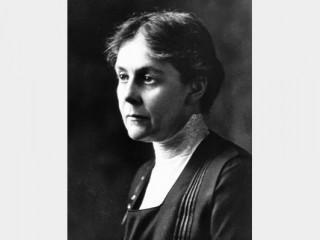
Alice Hamilton biography
Date of birth : 1869-02-27
Date of death : 1970-09-22
Birthplace : New York City, New York, US
Nationality : American
Category : Science and Technology
Last modified : 2010-11-22
Credited as : Physician, founder of industrial medicine in the U.S.,
The American physician Alice Hamilton is recognized as the founder of industrial medicine in the United States. She was the first woman on the faculty of Harvard Medical School.
Alice Hamilton grew up in Fort Wayne, Ind., in an affluent home. Her parents entertained guests who discussed major topics of the day, and they stimulated the thinking of their children by raising doubts about society's religious and social assumptions. Hamilton attended Miss Porter's School in Farmington, Conn., and in 1893 graduated from the University of Michigan Medical School. She interned in the New England Hospital for Women in Boston. There she serviced working-class people, the usual clientele of the first women doctors (who were seldom employed by the upper classes).
In 1894 Dr. Hamilton studied bacteriology in Germany and returned to accept her first teaching position at the Women's Medical College of Northwestern University in Chicago, III. Another important factor in her life seems to have been her decision to live at Chicago's settlement house, Hull House. Here she came into close contact with notable social reformers (including the founder of Hull House and one of America's first social workers, Jane Addams) and with the sick from the streets and the mills of the city. For several years she was torn between the medical-social work around Hull House and an equally strong desire to devote herself to research at the McCormick Institute for Infectious Diseases.
Eventually Dr. Hamilton's social passion and scientific skills combined as she plunged into the research and activity to control health hazards in the dangerous trades of mining and factory work. Her first real chance came in 1910, when the governor of Illinois appointed her to a commission to investigate occupational diseases. She inspected mines and factories to identify hazardous jobs. After the Federal government asked her to make her research nationwide, she spent 12 years identifying lead, arsenic, and mercury poisons, aniline dyes, picric acid, dust, bad ventilation, and other health hazards. On the basis of her research she was expected to present the needed antidotes and safeguards.
Always an outspoken feminist, Dr. Hamilton must have been excited to accept an invitation in 1919 to be the first woman to join the faculty of the Harvard Medical School. In 1935 she retired from Harvard but not from her national and international efforts to prevent industry from poisoning the earth. She was one of the first to warn of the lethal nature of atomic radiation.
The best book on Alice Hamilton is her autobiography, Exploring the Dangerous Trades (1943). For general background see George Rosen, A History of Public Health (1958).
















